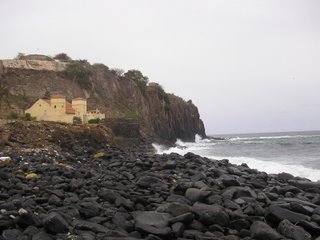For my fellow tree-huggers out there, there's an interesting article in today's NY Times about the marrying of the capital market and environmental innovation. About a decade ago, Nicholas Parker began the trade group Cleantech Venture Network, which aims to connect venture capitalists with start-up companies developing alternative sources of energy and other environmentally friendly pursuits. At the risk of echoing one of the tenets of the Bush Administration, I've always maintained that the best way to tackle the vast environmental problems we currently face would be to somehow make environmentalism profitable. Profit motive has always been the greatest driving force of mankind. If we could someone encourage a market demand for a cleaner environment, many of our environmental problems would be solved. Fortunately, it seems that one side effect of higher oil prices has been a greater interest in alternative sources of energy. Now that there's the potential that money can be made from protecting the environment maybe we'll see some significant advances in environmental sustainability over the next few years. (As an aside, I've always believed that we should be paying more for gasoline to take into account the negative externalaties in order to reflect the true cost of the gasoline that we consume. But, hey, that's easy for me to say because I've never owned a car and have no intention of getting one anytime soon.)
While profit motive has led to substantial improvments in quality of life, especially since the industrial revolution, economics does have its limits. I believe that it was John Maynard Keynes (or perhaps Adam Smith) who predicted that as a result of the increased interconnectedness of nations, war would be a thing of the past. By its very nature, war disrupts the free flow of capital, and, by their very nature, human beings are extremely reluctant to willingly pass up financial gains. Clearly, he was wrong. Maybe humans' need to conquer is the only thing that surpasses our greed. Although we may be stuck with war through the end of time, I hope at least that our desire for wealth accumulation will lead us to a cleaner, prettier world in a generation's time.
Friday, August 25, 2006
Monday, August 14, 2006
No Comment
I just read an interesting article in the Guardian about President Bush, Israel, and Hizbullah . I have a few comments associated with this article, but I'm going to keep them to myself. However, I will note that the subject of this post and my previous post are almost too perfect together. After reading the article, feel free to email me if you'd like to discuss.
Populism for the Information Age
It seems like everyone has a blog nowadays. Even the President of Iran, Mahmoud Ahmadinejad, just launched a blog of his own. There's only one entry so far, but I thought it was a pretty interesting read. He gives a quick background and justification for opposing what he refers to as the "Great Satan" -- i.e. the United States -- at every turn citing the US involvement in propping up the Shah prior to the Revolution and the US suuport for Saddaam during the 8-year Iran-Iraq War. My knowledge of the Middle East history is limited at best, so I don't really know how much of what he wrote was actually true and how much is biased, but it's interesting getting a glimpse inside the head of a world leader that's very much the topic of conversation among international affairs circles. I think it would be nice if other leaders here in the US and around the world would take the time to actually inform their constituents why they are doing the things that they do. Of course not everything can be broadcast over the internet for national security reasons, but politicians could do a much better job at informing the public. It would be a welcomed development if, for example, President Bush were to actually lay out his ideals and goals and beliefs and how he arrived at those beliefs instead of simply searching for the next great soundbite for the the morning papers.
I use President Bush as an example, but the same holds true for all politicians. When was the last time a politician truly tried to communicate with voters? When we step into the voting booth, do any of us really know what the idealogy and motivation is of any of the men and women who appear on the ballot? Our nation was basically founded on idealogy. Alexander Hamilton, John Jay and James Madison set out to communicate this idealogy when they published the Federalist Papers to advocate the ratification of the US Constitution. They methodically went through the theory of government as they saw it. Once the men were in office (Madison as our 4th President and Hamiliton as Secretary of Treasury), there was no question of where they stood on certain issues because there was a standing document laying it all out. I don't know whether any subsequent electorate has had the opportunity to make a truly informed decision when casting their votes. Therefore, I applaud President Ahmadinejad's effort to connect with the average Iranain voter. While I may not agree with what he says, I definitely commend him on his courage to state his beliefs and let the Iranian people decide what they think.
If you'd like to take a look, here's a link to his blog, complete with an internet poll about whether you think the US and Isreal are intentionally trying to incite another World War through an attack on Lebanon. As it stands right now, 45% think 'yes' and 55% voted 'no'.
I use President Bush as an example, but the same holds true for all politicians. When was the last time a politician truly tried to communicate with voters? When we step into the voting booth, do any of us really know what the idealogy and motivation is of any of the men and women who appear on the ballot? Our nation was basically founded on idealogy. Alexander Hamilton, John Jay and James Madison set out to communicate this idealogy when they published the Federalist Papers to advocate the ratification of the US Constitution. They methodically went through the theory of government as they saw it. Once the men were in office (Madison as our 4th President and Hamiliton as Secretary of Treasury), there was no question of where they stood on certain issues because there was a standing document laying it all out. I don't know whether any subsequent electorate has had the opportunity to make a truly informed decision when casting their votes. Therefore, I applaud President Ahmadinejad's effort to connect with the average Iranain voter. While I may not agree with what he says, I definitely commend him on his courage to state his beliefs and let the Iranian people decide what they think.
If you'd like to take a look, here's a link to his blog, complete with an internet poll about whether you think the US and Isreal are intentionally trying to incite another World War through an attack on Lebanon. As it stands right now, 45% think 'yes' and 55% voted 'no'.
Tuesday, August 08, 2006
The End of Poverty
Back during my undergraduate days at Georgetown, Father Schall, my political theory professor, used to advise us that great works were best enjoyed when read in the location in which they were written. The politics of Cicero were best pondered on the streets of Rome. Rousseau's discourses were best read in a Parisian cafe. John Locke's democratic ideals should be contemplated over a pint in a British pub. Finally seven years later, I finally put Fr. Schall's suggestions into practice... sort of. Before embarking upon my recent trip to Senegal, I picked up a copy of Jeffrey Sachs' End of Poverty. While I'm sure Professor Sachs wrote most of this book in his office at Columbia University, much of the research that went into the book was gathered in Africa. And Fr. Schall was correct, reading about a subject in the location does make the work more impactful somehow. Learning about development issues in Africa from Africa, makes everything seem more real and in your face.
Sachs attempts to write a roadmap for ending extreme poverty over the next two decades, a goal championed by the United Nations' Millienium Goals. Despite the seemingly impossible task he sets out for himself at the start of the book, I finished the book convinced that it was all very possible and that he had the strategy to accomplish it. It's quite an amazing book. He starts out by setting the stage: presenting the most challenging regions to gloabal developement. He then goes on to give specific reasons as to why some countries have achieved development while others have not, despite the fact the all countries started off at basically the same starting point back in the 17th Century when everyone was poor. Next, he chronicles some of the work that he has done personally in Bolivia, Poland, Russia, etc. to battle hyperinflation and help get those countries back on track. After laying out the case and what needs to be done, he spends the second half of the book detailing how to do it, how to pay for it and why it's in the interest of the rich to actually do it. I was thoroughly impressed by the whole endeavor.
Now that Sachs has clearly shown that it is indeed possible, at least theoretically, to end poverty by 2025 (the target date of the UN Millenium Development Goals), the really hard part is to convince world leaders and the electors in democratic societies to actually do it. How we accomplish that goal isn't covered in this book, but maybe that's someone else's job. With this book, Sachs has led us to the water, but now it's up to the rest of us to take a drink.
Sachs attempts to write a roadmap for ending extreme poverty over the next two decades, a goal championed by the United Nations' Millienium Goals. Despite the seemingly impossible task he sets out for himself at the start of the book, I finished the book convinced that it was all very possible and that he had the strategy to accomplish it. It's quite an amazing book. He starts out by setting the stage: presenting the most challenging regions to gloabal developement. He then goes on to give specific reasons as to why some countries have achieved development while others have not, despite the fact the all countries started off at basically the same starting point back in the 17th Century when everyone was poor. Next, he chronicles some of the work that he has done personally in Bolivia, Poland, Russia, etc. to battle hyperinflation and help get those countries back on track. After laying out the case and what needs to be done, he spends the second half of the book detailing how to do it, how to pay for it and why it's in the interest of the rich to actually do it. I was thoroughly impressed by the whole endeavor.
Now that Sachs has clearly shown that it is indeed possible, at least theoretically, to end poverty by 2025 (the target date of the UN Millenium Development Goals), the really hard part is to convince world leaders and the electors in democratic societies to actually do it. How we accomplish that goal isn't covered in this book, but maybe that's someone else's job. With this book, Sachs has led us to the water, but now it's up to the rest of us to take a drink.
Monday, August 07, 2006
Sunday, August 06, 2006
Big Love
So one of the more interesting things I learned during my recent trip is that polygamy is alive and well in Senegal. Not that I have anything against polygamy necessarily, but it was just interesting being in a place that openly practiced it. I was told that Senegalese law allows for a man to have up to four wives. Aside from the fact that I don't understand why anyone would even want to have four wives, I'm very interested in understanding how the logistics of such a relationship would play out. I met a few married couples in Dakar, but unfortunately, I don't think I met any men that had multiple wives. I understand that the first wife is supreme over any subsequent wives, but beyond that, I don't know how the whole arrangement works. Do they all live together, or do they generally maintain separate residences and the man divides his time accordingly? Are all children equal, or does the preference given to the first wife extend to the children she bears as well? It seems to me that it would be a very complicated and very delicately balanced relationship, but it's likely that they've been practicing polygamy for centuries and have no trouble negotiating all of the potential pitfalls that would be common to novices.
One woman that I met there had been dating a married man for several years. After 9 years of what I would characterize as him stringing her along, she learned that he had made a pact with his wife to refrain from taking another wife despite the aspirations of the woman that I had met, who was hoping to become wife number 2. As the situation stood by the time I left, as relayed to me by my friend, the woman and the married man were actively trying to pursuade the wife to release the husband from his aggreement so that he could take a second wife. What seemed odd to me as a westerner, was not so much that the woman was willing to be wife number 2, but the fact that she was the one most actively pursuing that position. Although she was well aware that she would be playing second fiddle to his first wife for the rest of her life, she had decided that she wanted to be with this man and was determined to convince his wife to allow her into their family. The whole situation seems so opposed to our notions of feminism here in the west. There just seems like there is something inherently wrong with her pursuing such a position of inferiority. However, different cultures have very different rules and norms. Maybe from her point of view, asserting her desire to be with this particular man was her form of self-empowerment. Maybe it's not about the man at all. Maybe marriage to her is simply a tool to gain greater access in society so that she can more easily accomplish her goals in life. Or maybe not. Who knows. I just think it's all very interesting.
One woman that I met there had been dating a married man for several years. After 9 years of what I would characterize as him stringing her along, she learned that he had made a pact with his wife to refrain from taking another wife despite the aspirations of the woman that I had met, who was hoping to become wife number 2. As the situation stood by the time I left, as relayed to me by my friend, the woman and the married man were actively trying to pursuade the wife to release the husband from his aggreement so that he could take a second wife. What seemed odd to me as a westerner, was not so much that the woman was willing to be wife number 2, but the fact that she was the one most actively pursuing that position. Although she was well aware that she would be playing second fiddle to his first wife for the rest of her life, she had decided that she wanted to be with this man and was determined to convince his wife to allow her into their family. The whole situation seems so opposed to our notions of feminism here in the west. There just seems like there is something inherently wrong with her pursuing such a position of inferiority. However, different cultures have very different rules and norms. Maybe from her point of view, asserting her desire to be with this particular man was her form of self-empowerment. Maybe it's not about the man at all. Maybe marriage to her is simply a tool to gain greater access in society so that she can more easily accomplish her goals in life. Or maybe not. Who knows. I just think it's all very interesting.
Subscribe to:
Comments (Atom)




